
20 June 2017
The biggest housing challenge is in the Global South
Migration to cities is a global trend: over 54% of the world population live in cities. Cities in the Global South deal with a lot of housing challenges because of the rapid urbanisation. “These challenges are way bigger than, for example, the Netherlands faced at the end of the 19th Century”, states Ellen Geurts of The Institute of Housing and Urban Development Studies (IHS). “Most people live in very poor, informal housing.”
During the event ‘Housing for the Global South: policies and design’ the challenges were addressed on the basis of four statements. The statements came from four organisations working in the Gobal South: IHS (also the organiser of the event), Cities Alliance, TU Delft and Reall. Firstly, the attendees discussed them in groups, which was really great as you were confronted by the knowledge of the others. Afterwards the organisations explained their view on the matter. I summarized the conclusions.
1. ‘Social housing is a function of (local) government and they are best placed to provide social housing’ – IHS
Yes, the government has a mandate in affordable housing but, basically, it doesn’t need to provide it, as the attendees state. It needs to be an enabler and facilitator and set up the rules. Geurts explains that it depends on the country to what extent the government can bear responsibility. “It’s not an easy question to answer. Sometimes the government can be the provider of social housing, in other countries it can organise the management”.
2. ‘Affordable (social) housing demands standardisation and repetition of design features’ – TU Delft
According to the attendees we should distinguish standardisation in product and in process. They see the financial benefits of standardisation, as repetition is efficient. But they also foresee problems like loss of creativity, flexibility and a sense of belonging. Therefore they came up with three conditions to benefit from standardisation. First of all there needs to be space for individual expression. Secondly, the design needs to be open to improvements by being able to adopt future developments. At last, only quality can me repeated, in order to prevent to make the same mistake over and over again. Nelson Mota of the TU Delft couldn’t agree more.
3. ‘Location, location, location is what should concern affordable housing’ – Cities Alliance
The attendees state that it’s more a matter of accessibility, so the people can get to the city centre where they can make money. The location of affordable housing must be chosen by the means of the possibilities there are. Omar Siddique of Cities Alliance agrees. He states that sometimes for the people sake it’s even better to construct a road then to build houses. The attendees also noted the importance of preventing segregation.
4. ‘Many of the global poor can live in affordable houses without a need for subsidy’ – Reall
The attendees come up with different ways to organise (indirect) subsidy, as mostly it’s not a good idea to just give money. Marie-Odile Zanders of Reall states that there are not enough subsidies, especially not in the South, to serve everybody. “Also the poor pay a lot for their homes. With their money it’s possible to build better housing. However, the problem is the lack of a good housing system and innovation to build cheaper houses. That’s why Real focuses on making local housing markets functional and brings in innovation.”




Comments